Guinea pigs make wonderful pets and important members of our families. As responsible pet owners, we want to ensure they stay healthy and happy through proper nutrition and care. One question that frequently arises is whether orange peels are safe for our little furry friends. In this article, we will explore the topic of whether guinea pigs can eat orange peels and whether they provide any nutritional benefits or risks for your pet’s diet.
Key Takeaways:
- Orange peels may be harmful to guinea pigs due to their high acid and sugar content.
- Guinea pigs need a specific balance of nutrients in their diet, and too much citrus can cause digestive issues.
- It’s always best to introduce new foods to guinea pigs slowly and carefully, monitoring for any signs of allergies or adverse reactions.
- There are alternative citrus fruits that are safer and more suitable for guinea pigs, such as kiwis and berries.
- Consult with a veterinarian or animal nutritionist before making any significant changes to your guinea pig’s diet to ensure they stay healthy and happy.
Understanding Guinea Pig’s Diet and Digestion
Before considering any specific foods for your guinea pig, it’s important to know their dietary needs and how their digestion works. Guinea pigs are herbivores and require a diet based on hay, fresh vegetables, and guinea pig pellets. Hay should form the foundation of their diet and should always be available.
Their digestive system is unique and complex, made up of a large cecum that helps break down fibrous foods and extract nutrients. Guinea pigs also require vitamin C, which they cannot produce themselves, so it is important to provide them with foods rich in this nutrient, such as bell peppers, kale, and parsley.
However, they are sensitive to certain foods that can cause digestive issues, such as gas, bloating, and diarrhea. It’s essential to avoid high-calorie and low-nutrient foods, such as junk food and treats, as well as foods high in sugar and fat.
Nutritional Value of Orange Peels for Guinea Pigs
Orange peels have a different nutritional composition than the fruit itself. While the orange fruit is a good source of vitamin C, folate, and potassium, the peel contains high levels of fiber and antioxidants.
However, guinea pigs have specific dietary needs, and orange peels may not provide the necessary nutrients for their optimal health. It’s important to balance their diet with a variety of fresh, hay, and pellet foods that meet their nutritional requirements.
If you want to offer your guinea pig orange as a treat, make sure to remove the peel and only offer the flesh. And remember, moderation is key when it comes to introducing new foods to your furry friend.
Potential Risks and Dangers of Orange Peels for Guinea Pigs
While orange peels may seem like a harmless addition to your guinea pig’s diet, there are potential risks and dangers to consider. One such risk is digestive issues, as citrus fruits, including orange peels, can cause stomach upset, bloating, and diarrhea in some guinea pigs.
Additionally, certain compounds found in orange peels, such as limonene and linalool, can be toxic to guinea pigs in large quantities. These compounds can cause liver damage and skin irritation, so it’s essential to monitor your guinea pig’s consumption of orange peels and other citrus fruits.
To avoid these risks and ensure your guinea pig’s health and well-being, it’s best to limit their intake of orange peels and other citrus fruits. It’s also crucial to introduce new foods gradually and watch for any signs of adverse reactions.
Overall, while orange peels may offer some nutritional benefits, they can also pose significant risks and dangers to your guinea pig’s health. It’s best to consult with your veterinarian and carefully manage your guinea pig’s diet to ensure they receive all the necessary nutrients without risking their health.
Recommended Citrus Intake for Guinea Pig’s Diet
When it comes to citrus fruits, including orange peels, guinea pigs should only consume them in moderation. The recommended amount of citrus for their diet is once a week, and it should not exceed 10% of their overall food intake.
While citrus fruits can be a source of vitamin C and other essential nutrients, too much citrus can also lead to diarrhea, stomach upset, and other digestive issues in guinea pigs.
It’s important to note that not all guinea pigs have the same dietary requirements, and their citrus intake may vary depending on their age, weight, and overall health status. Always consult with a veterinarian before making any significant changes to your guinea pig’s diet.
Additionally, if you decide to include citrus fruits, including orange peels, in your guinea pig’s diet, make sure to remove all seeds, as they can be a choking hazard. When introducing any new food, including citrus fruits, do so gradually to avoid any sudden changes that could lead to digestive discomfort.
Takeaway:
While guinea pigs can enjoy a small amount of citrus fruits, including orange peels, it’s essential to keep their intake in moderation and seek professional advice before incorporating new foods into their diets.
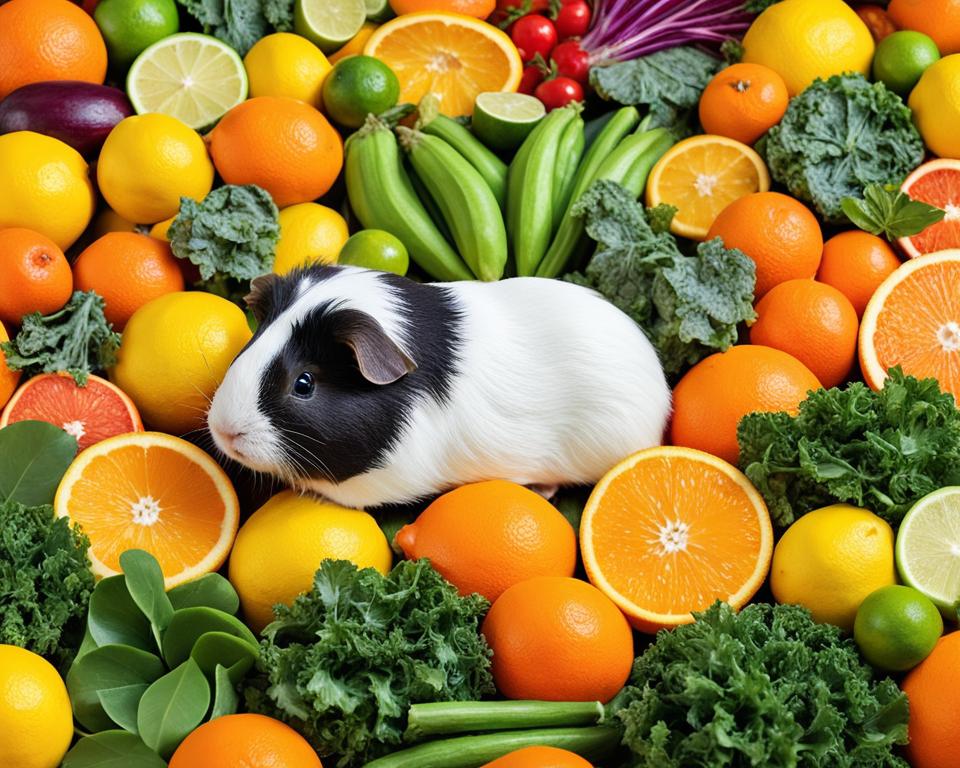
Alternative Citrus Fruits for Guinea Pigs
If you decide that orange peels are not suitable for your guinea pig’s diet, there are alternative citrus fruits that you can consider. Some of these fruits include:
- Lemons: Lemons are an excellent source of vitamin C, and they are safe for your guinea pig to consume in moderation. However, like all citrus fruits, they are high in acid, which can cause digestive problems if overfed.
- Limes: Limes are another good option, but like with lemons, it is essential to provide them in moderation.
- Kiwifruit: Kiwifruit is an excellent source of fiber and vitamin C, making it a nutritious supplement to your guinea pig’s diet. However, be sure to remove the seeds before feeding it to your pet.
- Clementines: Clementines are another suitable alternative for guinea pigs, as they are low in acid and high in vitamin C.
Remember to always introduce new fruits gradually, as sudden changes in diet can upset your pet’s digestive system. If your guinea pig shows signs of discomfort or allergic reactions to any type of citrus fruit, stop feeding them immediately and consult with your veterinarian.
Introducing New Foods to Guinea Pigs
Guinea pigs can be susceptible to digestive issues if new foods are introduced too quickly or in large amounts. When introducing new fruits like oranges or any other citrus fruits, it’s important to start with small portions.
It’s also essential to observe your guinea pig’s reactions after every new addition to their diet. If there are any signs of discomfort or distress, discontinue feeding them the new food and consult a veterinarian.
To help your guinea pig adjust to a new diet, start by offering small amounts of fruits such as oranges, along with their usual diet. Gradually increase the amount of new food over a few days up to a maximum amount of 10% of their total diet.
When feeding oranges or other citrus fruits to guinea pigs, remove any seeds or pits that can be a choking hazard. It’s also important to wash the fruit thoroughly before feeding it to your pet.
With patience and care, introducing new foods, including oranges and other citrus fruits, can provide your guinea pig with a varied and nutritious diet.
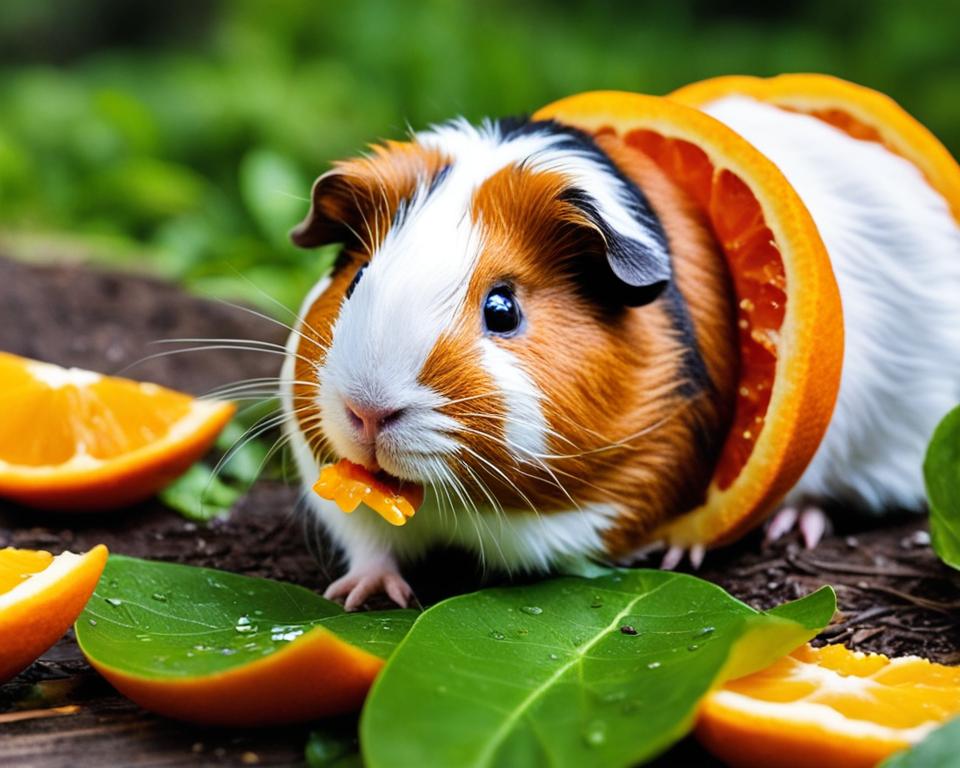
Signs of Allergic Reactions in Guinea Pigs
Guinea pigs are susceptible to allergic reactions to certain foods, including citrus fruits such as oranges and their peels. It’s essential to observe your pet closely and keep an eye out for any reactions to these foods. Common signs of an allergic reaction in guinea pigs may include:
- Scratching and biting at their skin: If your guinea pig is excessively scratching or biting at their skin, it could be a sign of an allergic reaction.
- Redness and swelling: Allergic reactions can cause redness and swelling, particularly around the face and mouth.
- Breathing difficulties: In severe cases, allergic reactions may cause breathing difficulties in guinea pigs. If you notice any signs of respiratory distress, seek veterinary assistance immediately.
- Diarrhea and vomiting: Digestive disturbances are common in guinea pigs with allergic reactions. If you notice diarrhea or vomiting, monitor your pet closely and seek professional advice if the symptoms persist.
If you suspect your guinea pig is having an allergic reaction to a specific food, including orange peels, remove it from their diet immediately. Consult with your veterinarian to determine the underlying cause of the reaction and the appropriate course of action.
Conclusion
After exploring the nutritional value and potential risks of feeding orange peels to guinea pigs, it’s clear that they are not recommended for their diet. Orange peels can cause digestive issues and may be toxic to their health. However, other citrus fruits such as mandarins and clementines can be suitable in small amounts.
It’s crucial to understand your guinea pig’s dietary needs and introduce new foods gradually to prevent stomach upset. Always monitor your pet for any signs of allergic reactions or digestive issues. If you have any concerns about their diet, consult with a veterinarian who specializes in small animals.
Remember, a well-balanced diet is essential for your guinea pig’s health and well-being. Stick to their recommended diet and offer a variety of healthy foods to ensure they receive all the necessary nutrients they need. Your furry companion will thank you!
FAQ
Can guinea pigs safely eat orange peels?
No, guinea pigs should not consume orange peels. While oranges themselves can be a healthy addition to their diet, the peels can be difficult for them to digest and may cause digestive issues.
What are the potential risks of feeding orange peels to guinea pigs?
Feeding orange peels to guinea pigs can lead to digestive problems such as bloating and diarrhea. Additionally, the oils present in orange peels can be toxic to guinea pigs if ingested in large quantities.
Are there any alternative citrus fruits that are safe for guinea pigs to eat?
Yes, there are alternative citrus fruits that are safer for guinea pigs to consume. Some examples include small amounts of tangerines, clementines, and mandarins. However, these should still be given in moderation.
How should I introduce new foods, like oranges, to my guinea pig’s diet?
It’s important to introduce new foods gradually to avoid shocking your guinea pig’s digestive system. Start by offering a small piece of peeled orange and monitor their reaction. If there are no adverse effects, you can gradually increase the amount over time.
What are the signs of allergic reactions in guinea pigs?
Signs of allergic reactions in guinea pigs include skin rashes, itching, sneezing, wheezing, and difficulty breathing. If you notice any of these symptoms after introducing a new food, consult a veterinarian immediately.
Can guinea pigs consume any part of the orange?
Guinea pigs can consume small amounts of the flesh of oranges as a treat. However, it’s crucial to remove the seeds and any white pith, as these parts can be harmful to them.
How much citrus, including oranges, should guinea pigs consume?
Citrus fruits, including oranges, should only make up a small portion of a guinea pig’s diet. It is recommended to limit citrus intake to no more than once a week and offer a small slice as a treat rather than a regular part of their daily meals.
What other fruits and vegetables are safe for guinea pigs to eat?
Guinea pigs can enjoy a variety of fruits and vegetables, including bell peppers, cucumbers, carrots, and leafy greens like spinach and kale. It’s essential to introduce new foods gradually and provide a balanced diet.
Can guinea pigs consume the zest of oranges?
No, guinea pigs should not consume the zest or peel of oranges. The essential oils present in the zest can be harmful to their digestive system and overall health.

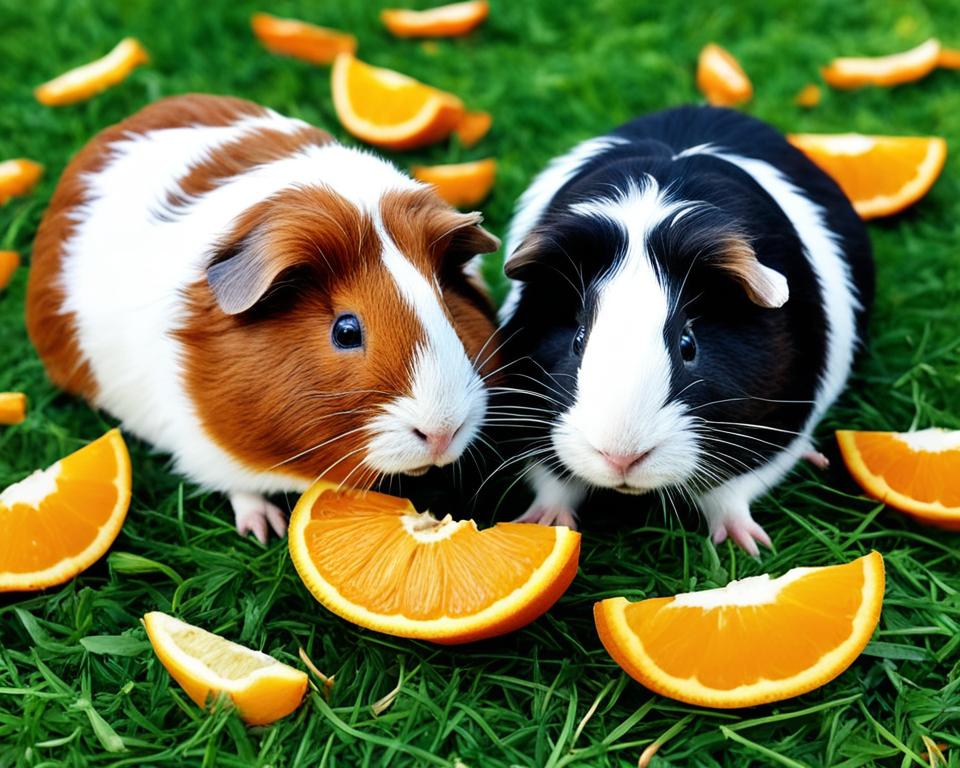
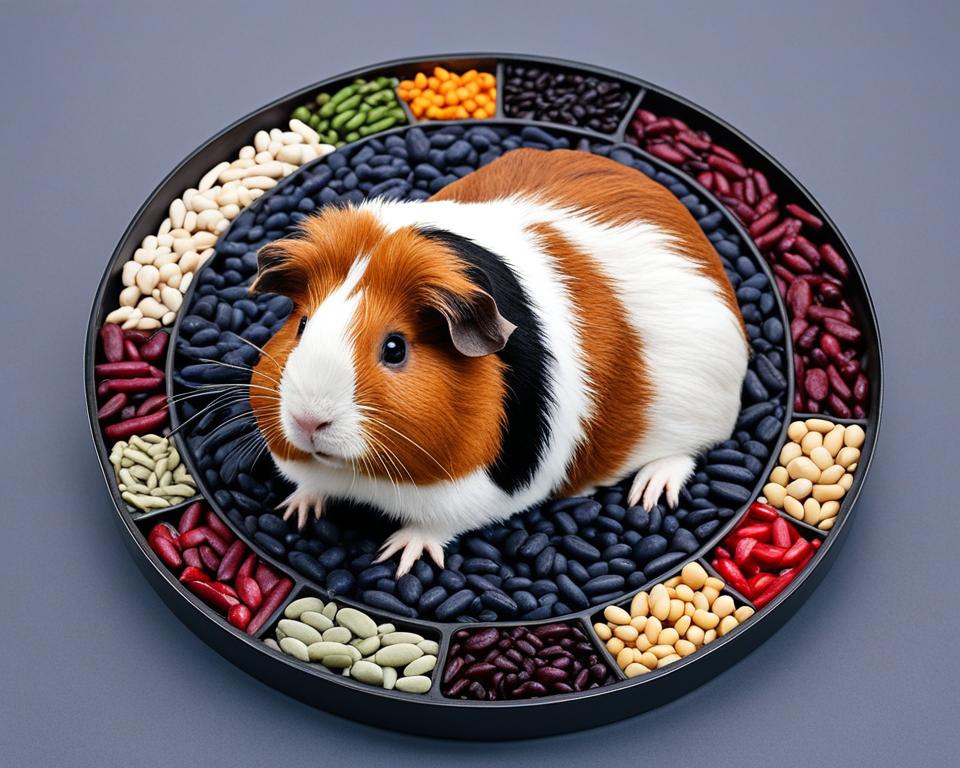
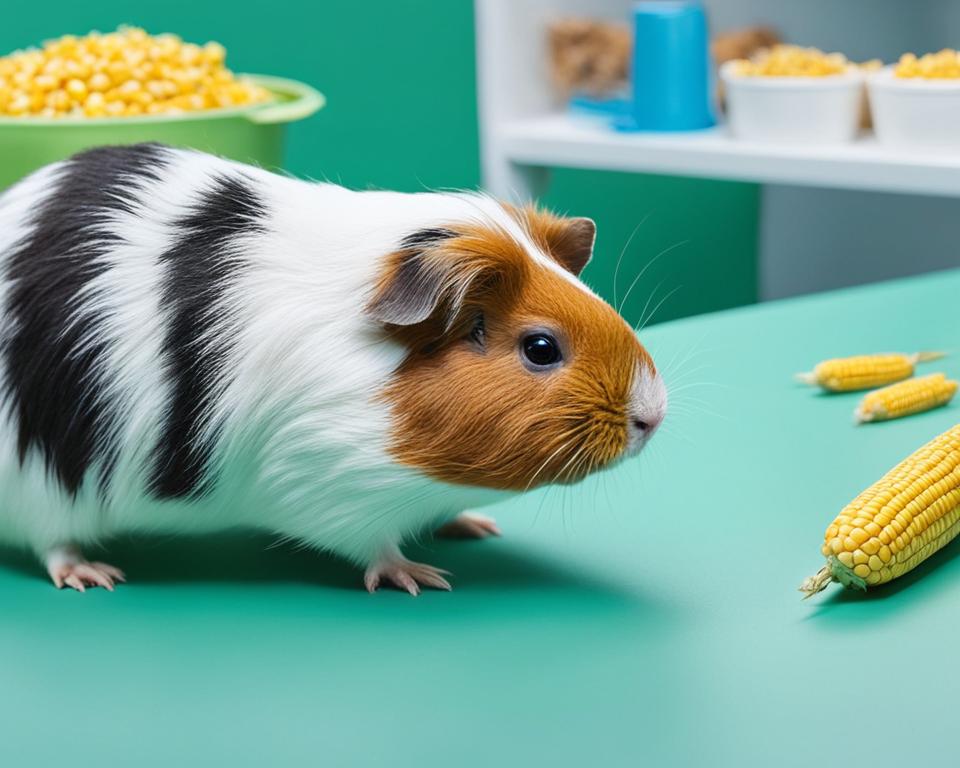
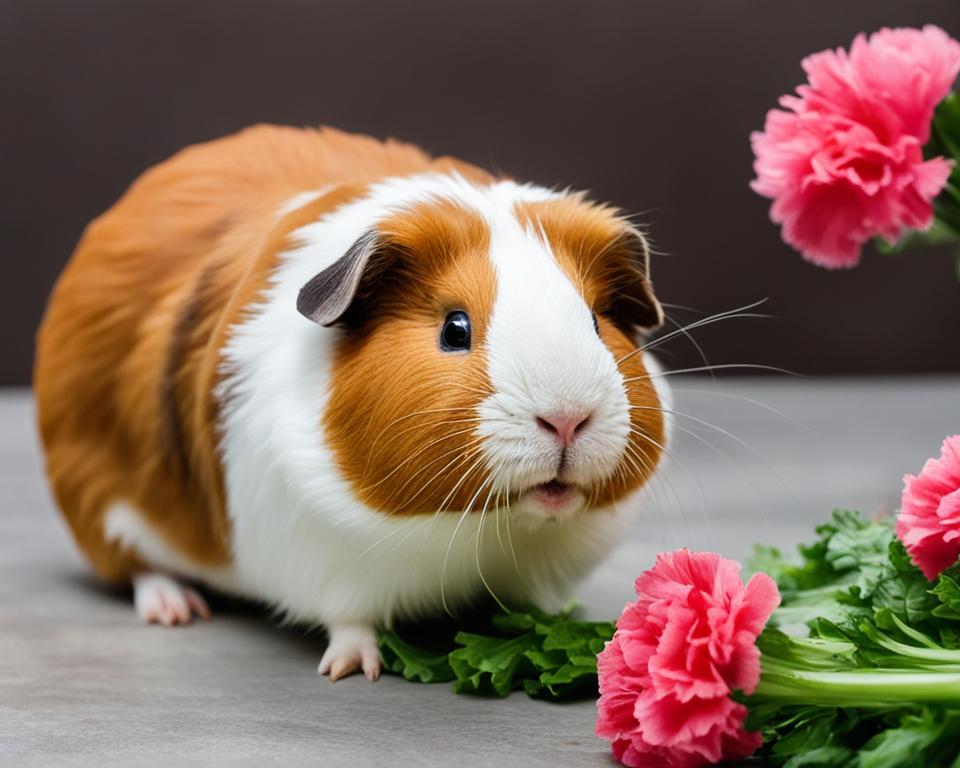
Leave a Reply